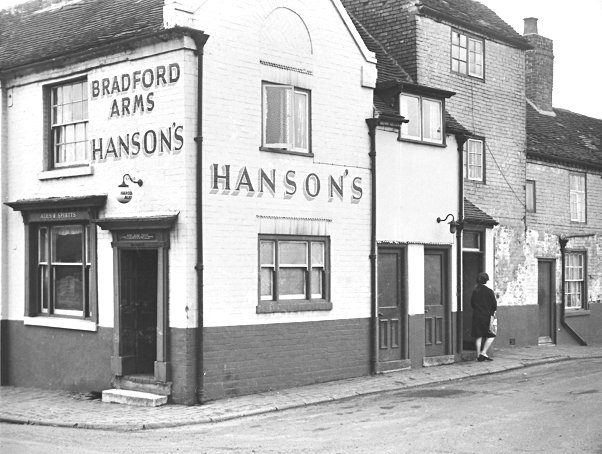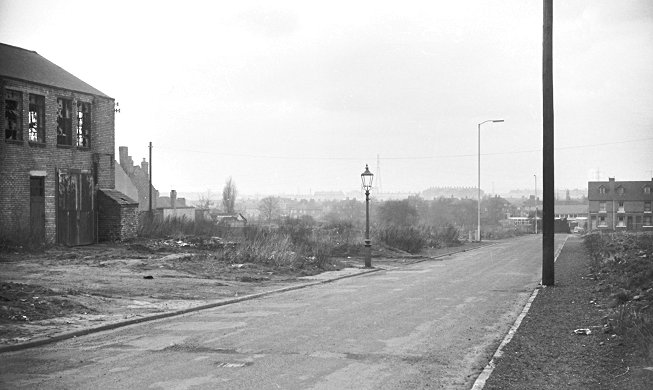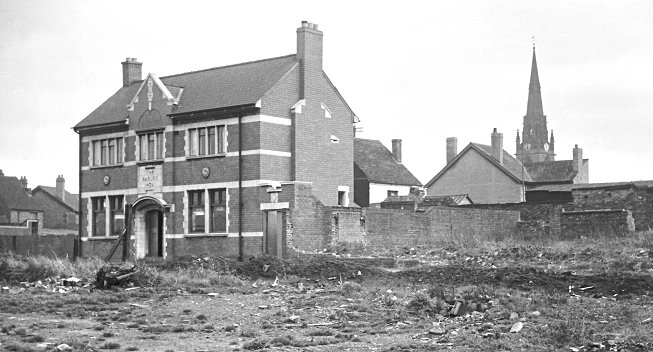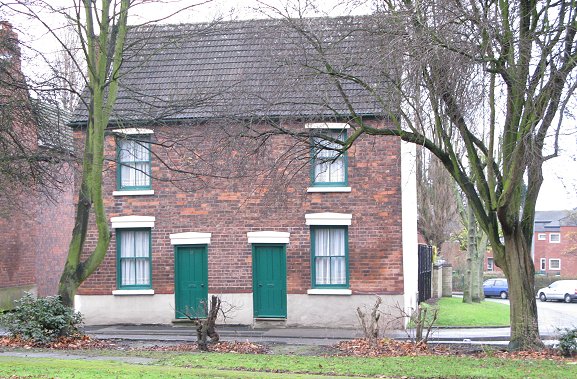|
We are always hearing that times
were tough in the old days. Well, they clearly were – as
the words of Alice Hall of Darlaston testify. She was
born in 1904 and her stories of real hardship - and of a
childhood without the care of a mother - bring to life a
bygone era.
Official documents tell us the key
dates in the lives of our forebears. As such
certificates of births, deaths and marriages are vital
to all historians - and the information they give us can
be strengthened by census entries. And yet, important as
such evidence is, it lacks much. It can give us pointers
towards the lives led by our people, but it cannot pass
on their thoughts and emotions, their trials and
tribulations, their hopes and achievements - the very
warp and weft of their being. For such we need to hear
them, either through their memoirs or their recordings.
One of those fortunate to have the
words of someone from the past is Pauline Poole. The
words are those of her mother, who died in 1994. Pauline
wrote them down because "I was listening to her opinions
one day, which was in 1989, of life at that time, when
she began to compare then with how it was in her early
life and I decided to make a note of what she was
saying. I was a secretary and could still capture her
words very easily in shorthand. I came across my
original typed copy, which was done on a small portable
typewriter, when I was looking for something else the
other day and having re-read it. It struck me that maybe
you would find it interesting to read too."
Pauline stresses that she is "very
interested in anyone's personal stories but more so the
further back we go, and she believes that it is vital to
keep the past alive for the generations to come.
|

The Bradford Arms, known as 'The
Frying Pan' stood on the corner of Bilston Street and
Eldon Street. From the
collection of the late Howard Madeley. |
|
Misfortunes
She says: "To me now, my own
childhood and early life is like looking back to a black
and white film and I feel that socially, life is moving
on a pace never known before. After all, when we wake up
each morning, the previous day is our personal history."
Alice Hall, as she was born, knew
real hardship. Her memories bring to the fore the harsh
effects of personal loss and the misfortunes of a
childhood without the care of a mother who died too
young. Alice grew up in a hard era, one in which the
poor only got by with the help of kith and kin. When
that extended family was missing then the travails of a
youngster could be heart wrenching. Yet for all the
adversities she faced, Alice was never embittered.
Here then are the moving words of
Alice Hall, the beloved mother of Pauline Poole. Through
her words she lives on:
“Quite often, when I hear someone
complaining that the state benefits they are getting aren't enough to live on, it makes
me think back to my own young life and reflect on how
very different things were then. I was born on August
8th, 1904, in No. 2 Court, Bilston Street, Darlaston,
very close to the house where John Wesley stayed and
which it was said, he used as a Meeting House.
My family later moved to No. 4,
Eldon Street. My brother, sister and I and a tiny baby
were left without a mother in 1907, when I was three
years old. I clearly remember my mother being ill in bed
downstairs and one day hearing my brother cry out in
pain in the street. There was a pub on the corner at the
top of the street called the 'Bradford Arms' (nicknamed
'The Fryin' Pon') and like most pubs at that time, they
made soup which people would fetch in a jug for a few
pence.
My brother had been running up the
street with a friend named Shaler (surname) and he
bumped into a lady coming out of the pub with a jug of
steaming leek soup in her hands. The leeks stuck to his
neck and he carried the scar for the rest of his life.
Mother struggled out of bed and I can see her now,
standing on the doorstep with long black wavy hair,
shouting, 'Oh! My lad!' Shortly afterwards, back in bed,
I remember her words, 'Let me back' - and she died.
Rose's Bull was blowing 9am at the time. This was a
factory in nearby Stafford Road.
|
|

Eldon Street in the 1960s when
most of the buildings in the area had been demolished.
From the collection of the late Howard Madeley. |
|
Funeral
For the funeral I wore a little
black dress with puffed sleeves and white cuffs and
collar and I remember it was a horse-drawn hearse. The
horses had black plumes and the men wore black high hats
and black tail-style jackets. The funeral firm was S.
Webb & Son of Wednesbury. An aunt came to help for a
while and she lay on the baby, who shared the same bed,
and the child was suffocated.
From then on, the family was split
up. My brother, Ted, was fostered with a family in
Slater Street, Darlaston. He was about seven at the
time. His friend's family, the Shalers, had a shop in
Cross Street, at the bottom of Eldon Street. Our sister
Irene, who was only a toddler, was looked after by
relatives in Dudley, where our mother's family came from
and we lost touch with her until I was fourteen and
needed my birth certificate when it was time to leave
school and get a job.
My brother, Ted, was kicked on the
shin about this time and it was ulcerated. He was looked
after by Dr. Fox at the Workhouse, 100 Pleck Road,
Walsall, now a part of the Manor Hospital. I was in the
Workhouse for a time. I had been offered to several
people to live with them and I was turned away. In the
Workhouse, I can remember a man with a disfigured mouth
through cancer.
We used to be given cod liver oil,
with an arrowroot biscuit to take the taste away. I
slept in a tall cot. My brother used to do jobs for Dr.
Fox when he was growing up which included going with him
to take care of the horse and governess's cart, while
Dr. Fox was at the Workhouse.
I used to go to the Old Church
School in School Street, Darlaston for a short time and
I can remember walking in file to St Lawrence's Rectory
garden for a party on the occasion of Queen Mary and
King George V's Coronation. The Rectory garden's big
entrance gates faced onto Church Street (opposite what
is now a chemist). The garden gates have only recently
been removed and the entrance bricked up in the wall,
but the brick gate posts are still there, on either
side. (This was early in 1989.) We were given a small
metal box of chocolates with the King 'and Queen's heads
on the lid. I shared a desk with Percy Hickman, whose
family shop was a grocer's, where the Darlaston Carpet
shop is now, by the 'White Lion' pub in The Fode.
Then a family called Owen
eventually took me in for a weekly payment of 3/- (three
shillings) from my Dad.
|
|

The Barley Mow pub in Cross Street,
awaiting demolition. From the collection of the late Howard
Madeley. |
|
Married
They lived at No. 4 Bush Street,
The Green, Darlaston. I had been passed from pillar to post, unwanted by
one or another but I was to stay here until I married in
1932. When the Old Church School was closed in 1980,
they had an open week for all the old pupils to look up
their own old school records, and the comment written in
the margin at the side of mine was 'Left the District'.
I had moved about a mile away, to Darlaston Green! I
went to the Central Schools in Slater Street from then
on and I think I was about nine by this time.
No. 4 Bush Street had two bedrooms
and the family were Granddad Owen (also known as Captain
Owen), Granny Owen, their daughter, her husband, their
granddaughter Florence (known as Floss) and me, plus two
men lodgers. There was one room downstairs with a back
kitchen which flooded every time it rained. Upstairs
there was a four poster where Granny Owen and her
granddaughter Floss slept at the top and I slept at the
bottom. Floss's mother and father slept in the other
bedroom and Granddad Owen and the two lodgers slept on
chairs downstairs.
They cooked on the fire and washed
in bucket or bowl of cold water which was fetched from
the one outside tap, shared by the other two houses in
the yard. St George's Church, with its very overgrown
church yard, was opposite. There was a family called
Jones who lived in the Dairy, two doors down from us.
This house is still there now, no longer a dairy but
called 'The Dairy's Still'. Mr Jones, an old gentleman,
used to come into the street with a big ear-trumpet. He
would put the trumpet to his ear, listen and say "Them's
over" (meaning the German planes!) I remember sitting on
the gutter very late at night and listening for the
zeppelins.
Air raids
During the air raids we would go
down the cellar of the house next door, where a family called Kimberly lived. (This
house is still there now, next to Bowling Green Close,
on the left as you look at the Close). Mrs Kimberly
would say "bring some bread" she was always afraid we
would be blocked in! The cellar was cleaned and
whitewashed and there was a stone sill all around the
walls where we would sit. Bowling Green Close is
actually cut through the site of our house and the other
two houses in our yard.
I remember during the summer, we
children would sit on the gutter in the early morning
light, doing corking with four nails knocked into an
empty wooden cotton reel. My Dad worked for Darlaston
Council for a time but then his main job was as a
maltster for Pritchard's Brewery. Mr. S. Canlett was in
charge and his name can still be seen in a glass window
at the town hall side of The Swan pub in Victoria Road.
|

The house on the left-hand corner of Bowling Green
Close, once occupied by the Kimberly family. |
|
When I was taken in by the Owen
family, I had only ‘ill-assorted leaves-off’ for
clothes, which people would give me and this included
shoes of sorts. I was once given a white pinafore by the
family who lived at and kept the old Darlaston Post
Office. I was so naive in those days, I believed that
the rails around the top of the Town Hall, on the
right-hand side roof, looking at the building from the
front, was where the devil lived!
I also remember a teacher, Miss
Nixon, taking me to Beecham's Chemist in Darlaston to
have a wart removed from my finger. The treatment cost 1
shilling and was paid for by the teacher. This was on a
Friday and the wart was gone by school time on the
Monday. In Bush Street, towards the top end where the
Old Bush pub stood (the present one is a new building
and has now been made into a rest home (1988/89).
There was a family who had a
daughter called Serran (Sarah Ann?) and she was a very bad cripple. She used to play
on the footpath and pitifully drag herself around on her
bottom. This was just accepted as it was, nothing was
ever done about it. There was no-one to care in those
days. You just got through life as best you could.
Most Saturday nights, after the
pubs closed, there would be rows and fights and the lamp
would go flying across the room, still alight and lamp
oil would spill everywhere. That was at our house.
Sometimes, rows would be so bad elsewhere in the street
that the furniture would be thrown out on to the street
- to be recovered next day, when they'd sobered up.
The families in the other two
houses in our yard were the Stanfields next to us, in
the middle house, and the Finches on the other end, next
to a gullet which led down the side of the big house
which is still there now, on the right-hand side of
Bowling Green Close as you stand facing it. At night,
sometimes, Floss and I would walk down The Green, down
Heath Road, to the Forge called Tolleson's and Bostock.
We would watch the puddlers at work and the big furnaces
open up. The men would be sweating and would wear big
handkerchiefs around their necks. This would be on the
left-hand side, at the end of Charles Richards & Sons
works, before the extension to Charles Richards factory
was built on the site in the 1930s.
When it was growing late, one of
the men would say, "Come on girls, it's time you went
home", and he would take us home. There was never the
slightest thought of danger or mistrust, they were
staunch, honest men. Men you could trust. There was a
large chimney breast in the downstairs room, where the
table and squab were and I used to sit on a stool under
the mantelshelf, in what is now called an 'inglenook'
for hours, nursing the cat. I often got shouted at for
putting my dinner down for the cat!
Daughters
One dinnertime, Grandad Owen came
in from the pub and saw me doing this and I pulled over
a chair which caused him to fall over. I ran for my life
all the way to Moxley, to the home of some relatives of
the Owens. They were Grandad Owen's brother and his wife
and three daughters, and they lived in Queen Street,
Moxley. The husband was a kind man and let me sleep on
the squab for the night.
Two of the three daughters found me
in 1988, after about sixty years. I had forgotten them,
but I had been in their minds all those years, even
though they were so much younger than me. They had tried
several times to find me. It was lovely to know that I
had had a link with a family all down the years, after
feeling that I had been unwanted all my young life. It
is like looking back to another world. What a great pity
the people of today don't realise just how lucky they
are, whatever help they get." |
 |
Return to
the
previous page |
|